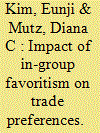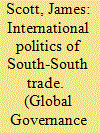| Srl | Item |
| 1 |
ID:
175285


|
|
|
|
|
| Summary/Abstract |
When forming opinions, mass publics may implicitly or explicitly value some people’s well-being more than others. Here we examine how two forms of this phenomenon—ethnocentric valuation and moral exclusion—affect attitudes toward international trade. We hypothesize that attitudes toward competition and believing that trade is a competition moderate the extent of ethnocentric valuation and moral exclusion; although all citizens value their co-nationals’ livelihoods systematically more than those of people in trading partner countries, greater ethnocentric valuation and moral exclusion occur when trade is seen as a competition and when individuals hold more positive attitudes toward competition.
|
|
|
|
|
|
|
|
|
|
|
|
|
|
|
|
| 2 |
ID:
156714


|
|
|
|
|
| Summary/Abstract |
Using a population-based survey experiment, this study evaluates the role of in-group favoritism in influencing American attitudes toward international trade. By systematically altering which countries gain or lose from a given trade policy (Americans and/or people in trading partner countries), we vary the role that in-group favoritism should play in influencing preferences.
Our results provide evidence of two distinct forms of in-group favoritism. The first, and least surprising, is that Americans value the well-being of other Americans more than that of people outside their own country. Rather than maximize total gains, Americans choose policies that maximize in-group well-being. This tendency is exacerbated by a sense of national superiority; Americans favor their national in-group to a greater extent if they perceive Americans to be more deserving.
Second, high levels of perceived intergroup competition lead some Americans to prefer trade policies that benefit the in-group and hurt the out-group over policies that help both their own country and the trading partner country. For a policy to elicit support, it is important not only that the US benefits, but also that the trading partner country loses so that the US achieves a greater relative advantage. We discuss the implications of these findings for understanding bipartisan public opposition to trade.
|
|
|
|
|
|
|
|
|
|
|
|
|
|
|
|
| 3 |
ID:
150585


|
|
|
|
|
| Summary/Abstract |
South-South trade has become a core component of the contemporary trade debate, but the idea of using preferential trade agreements among developing countries to foster industrialization and diminish dependence on the North has a long history. This article examines the North-South and South-South politics surrounding two efforts to operationalize this idea—the Protocol Relating to Trade Negotiations Among Developing Countries in the General Agreement on Tariffs and Trade and the Global System of Trade Preferences Among Developing Countries within the UN Conference on Trade and Development. It argues that the rich world has been somewhat obstructive in these efforts, but ultimately the primary cause for the weakness of these agreements is traced to failure by the Global South to make good on the rhetoric surrounding economic cooperation and South-South solidarity. Lessons from this history must be learned if current efforts to extend the GSTP are to bring greater benefits, particularly to the least developed.
|
|
|
|
|
|
|
|
|
|
|
|
|
|
|
|